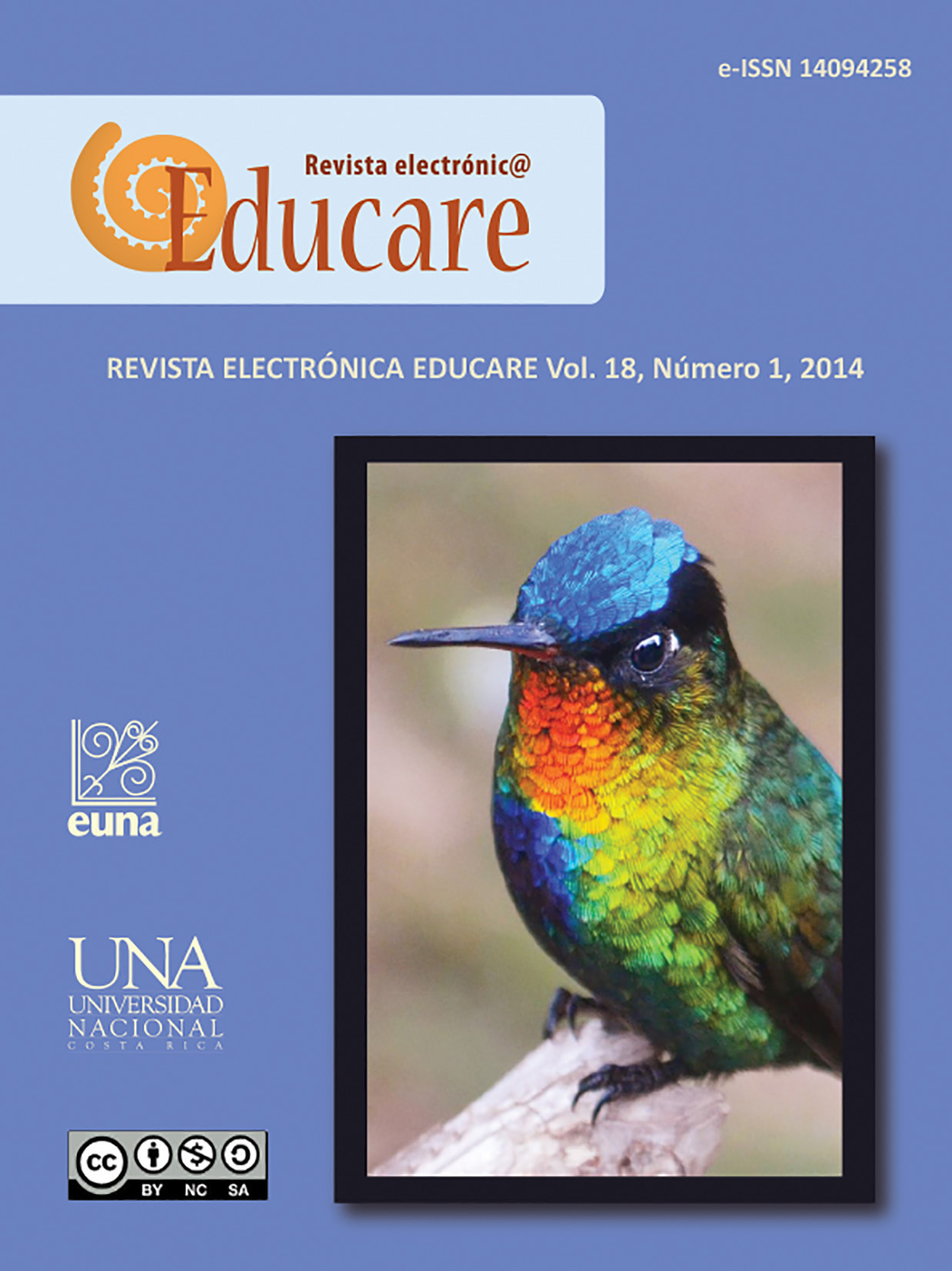Collaborative Work Strategy in the Universidad Nacional de Costa Rica-UNA Educación de Calidad Project: Workshop Experiences
DOI:
https://doi.org/10.15359/ree.18-1.9Keywords:
Collaborative work, significant learning, diversity, disabilities, educational needs, social inclusion.Abstract
This paper presents the experiences of a group of students with disabilities or educational needs in their professional development at the National University in Costa Rica. Based on the experience obtained in the Quality Education Project from Universidad Nacional (UNA) (UNA Educación de Calidad) between 2008 and 2012, the work team decided to focus on ways to support and follow up on this diversity group, particularly taking into consideration the collaborative work done by participants during the workshops for this period. To facilitate the project, the workshops were grouped into modules by topics. Results show the complexity and different shades of the collaborative actions between the groups of students in order to respond to the current educational reality. Based on the results, the need for the project team to continue developing this constructivist methodology is clear in order to allow participants to continue offering their contributions to the rest of the university community using their own interests and skills.
References
Abad, M., Álvarez, P. y Castro, J. F. (2008). Apoyo a la integración de estudiantes con discapacidad en la enseñanza universitaria: Algunas medidas y propuestas de actuación orientadora. Educación y Diversidad, 2, 129-150. Recuperado de http://dialnet.unirioja.es/servlet/articulo?codigo=2547369
Arce, J. y Ávila, L. (2011). Propuesta de apoyo educativo para los y las estudiantes que participan del Proyecto UNA Educación de Calidad de la Universidad Nacional con el fin de potenciar las diversas formas de aprender y desplegar nuevas destrezas y habilidades personales, académicas y sociales en su formación universitaria (Tesis de Licenciatura inédita). Universidad Nacional, Heredia, Costa Rica.
Candelo, C., Ortiz, G. y Unger, B. (2003). Hacer talleres: Una guía práctica para capacitadores. WWF Cali: Grafiq editores. Recuperado de http://www.gwp.org/Global/GWP-SAm_Files/Publicaciones/Hacer-talleres-gu%C3%ADa-para-capacitadores-esp.pdf
Consejo Nacional de Rehabilitación y Educación Especial (CNREE). (2011). Política Nacional en Discapacidad 2011-2021. San José, Costa Rica: Autor. Recuperado de http://www.cnree.go.cr/images/stories/Documentos/Ponadis.pdf
Costa Rica, Asamblea Legislativa. (29 de mayo de 1996). Igualdad de oportunidades para las personas con discapacidad (Ley N° 7600). La Gaceta. Diario Oficial N° 102. San José, Costa Rica: Imprenta Nacional.
Costa Rica, Asamblea Legislativa. (29 de setiembre del 2008). Convención sobre los derechos humanos de las personas con discapacidad (Ley N° 8661). La Gaceta. Diario Oficial N° 187. San José: Imprenta Nacional.
Cortes, M. J. e Iriarte, G. (s. f.). El taller. Modelo para una metodología globalizada e interdisciplinar en la unidad de currículo especial. Recuperdo de http://centros.educacion.navarra.es/creena/008psiquicos/PDFs/4.%20EL%20TALLER.%20Modelo%20para%20una%20metodologia.pdf
Echeita, G. y Martín, E. (1999). Interacción social y aprendizaje. En C. Coll, J. Palacios y Marchesi, A. (Comps.), Desarrollo psicológico y educación (Vol. 1, pp. 49-67). Madrid: Alianza Editorial.
Fontana, A. (diciembre, 2009). Retos de la atención a la diversidad: El caso de la Universidad Nacional de Costa Rica. Visón Docente Con-Ciencia, 9(51), 30-39. Recuperado de http://www.ceuarkos.com/Vision_docente/revistas/51/RETOS.pdf
Fontana, A. y Rodríguez, R. (2011). Formulación de la II fase del proyecto UNA educación de calidad 2012-2014 (código 0499-11). Heredia: Vicerrectoría Académica, Universidad Nacional. Manuscrito inédito.
Fontana, A. y Rodríguez, R. (2012). Informe anual del proyecto UNA educación de calidad (código 0499-11). Heredia: Vicerrectoría Académica, Universidad Nacional. Manuscrito inédito.
Hernández, R., Fernández, C. y Batista P. (2006). Metodología de la investigación. México D. F.: McGraw-Hill.
Maldonado, M. y Sánchez, T. (mayo-agosto, 2012). Trabajo colaborativo en el aula: Experiencias desde la formación docente. Educare, 16(2), 93-118. Recuperado de http://revistas.upel.edu.ve/index.php/educare/article/view/822
Organización de las Naciones Unidas [ONU] (2006). Convención sobre los derechos de las personas con discapacidad. Recuperado de http://www.un.org/spanish/disabilities/documents/gid/conventionfaq.pdf
Universidad Nacional (UNA). (1993). Estatuto Orgánico. Heredia: Departamento de Publicaciones UNA. Recuperado de http://www.juridica.una.ac.cr/index.php?option=com_remository&Itemid=0&func=startdown&id=144
Universidad Nacional (UNA). (15 de febrero del 2012). Manual de organización y funciones de la Vicerrectoría de Vida Estudiantil. UNA-Gaceta N° 2. Recuperado de http://www.juridica.una.ac.cr/index.php?option=com_remository&Itemid=0&func=startdown&id=384
Downloads
Published
How to Cite
Issue
Section
License
1. In case the submitted paper is accepted for publication, the author(s) FREELY, COSTLESS, EXCLUSIVELY AND FOR AN INDEFINITE TERM transfer copyrights and patrimonial rights to Universidad Nacional (UNA, Costa Rica). For more details check the Originality Statement and Copyright Transfer Agreement
2. REUTILIZATION RIGHTS: UNA authorizes authors to use, for any purpose (among them selfarchiving or autoarchiving) and to publish in the Internet in any electronic site, the paper´'s final version, both approved and published (post print), as long as it is done with a non commercial purpose, does not generate derivates without previous consentment and recognizes both publisher's name and authorship.
3. The submission and possible publication of the paper in the Educare Electronic Journal is ruled by the Journal’s editorial policies, the institutional rules of Universidad Nacional and the laws of the Republic of Costa Rica. Additionally, any possible difference of opinion or future dispute shall be settled in accordance with the mechanisms of Alternative Dispute Resolution and the Costa Rican Jurisdiction.
4. In all cases, it is understood that the opinions issued are those of the authors and do not necessarily reflect the position and opinion of Educare, CIDE or Universidad Nacional, Costa Rica. It is also understood that, in the exercise of academic freedom, the authors have carried out a rogorous scientific-academic process of research, reflection and argumentation thar lays within the thematic scope of interest of the Journal.
5. The papers published by Educare Electronic Journal use a Creative Commons License:














 The articles published by Educare Electronic Journal can be shared with a Creative Commons License:
The articles published by Educare Electronic Journal can be shared with a Creative Commons License: 



